Key takeaways
- Eventbrite simplifies event coordination by streamlining ticket sales, guest lists, and attendee communication, allowing organizers to focus on creating memorable experiences.
- Customization of event listings and ticket options enhances audience engagement and reflects the unique energy of each music project.
- Effective promotion through social media integration and email campaigns increases visibility and personal connection with potential attendees, leading to higher ticket sales.
- Real-time attendee management, flexible ticketing, and direct communication foster a vibrant atmosphere and enhance attendee experience at events.
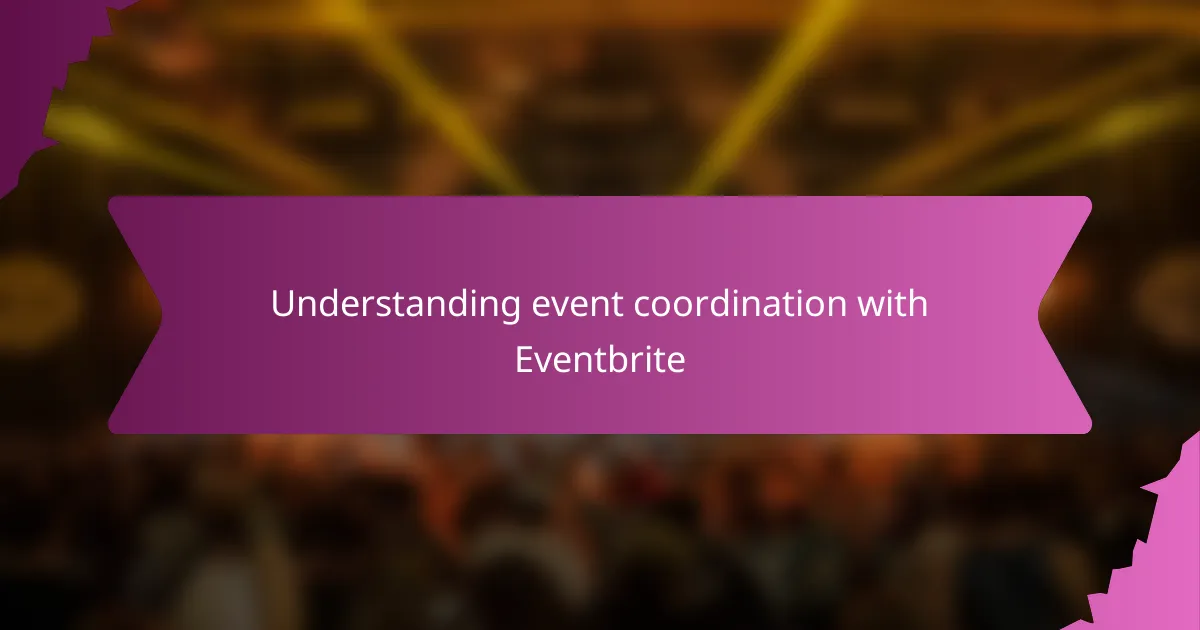
Understanding event coordination with Eventbrite
Eventbrite made me realize that coordinating an event isn’t just about organizing—it’s about creating an experience. The platform simplifies the chaos, letting me focus on the music and the vibe rather than endless spreadsheets. Have you ever felt overwhelmed by guest lists and ticket sales? Eventbrite takes that weight off your shoulders.
What struck me most was how intuitive the tools are. Setting up ticket tiers, tracking sales in real time, and communicating with attendees became almost effortless. It felt like having a personal assistant who understands the music scene as much as I do. Don’t we all want that kind of support when planning something meaningful?
Eventbrite also made me appreciate the importance of data. Seeing how many people registered and when gave me clues about the best times to promote my events. It sparked an “aha” moment—event coordination isn’t just logistics; it’s about connecting with your audience on their terms. That insight changed how I approach every music project I organize.
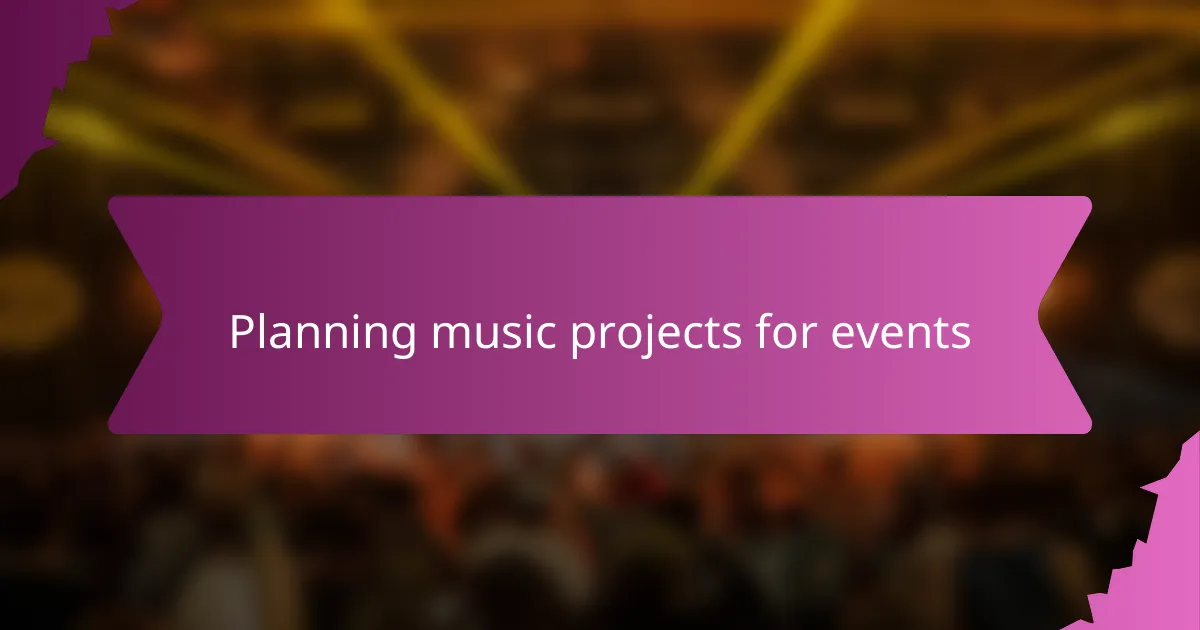
Planning music projects for events
When I start planning a music project for an event, I always ask myself: What story do I want the music to tell? This question shapes everything—from choosing artists to the setlist. It’s not just about filling a schedule; it’s about crafting a journey that resonates with the audience.
Sometimes the biggest challenge is juggling all the moving parts—rehearsals, equipment, venues—without losing sight of the artistic vision. I’ve learned to lean on detailed timelines and checklists, but I also leave room for spontaneity. After all, music is alive, and the event should feel vibrant, not rigid.
One thing I never overlook is the atmosphere. Lighting, stage setup, even crowd flow can make or break the experience. I recall a project where minor tweaks in the layout completely transformed how people connected with the music. It reminded me that thoughtful planning goes beyond logistics; it’s about shaping emotions too.
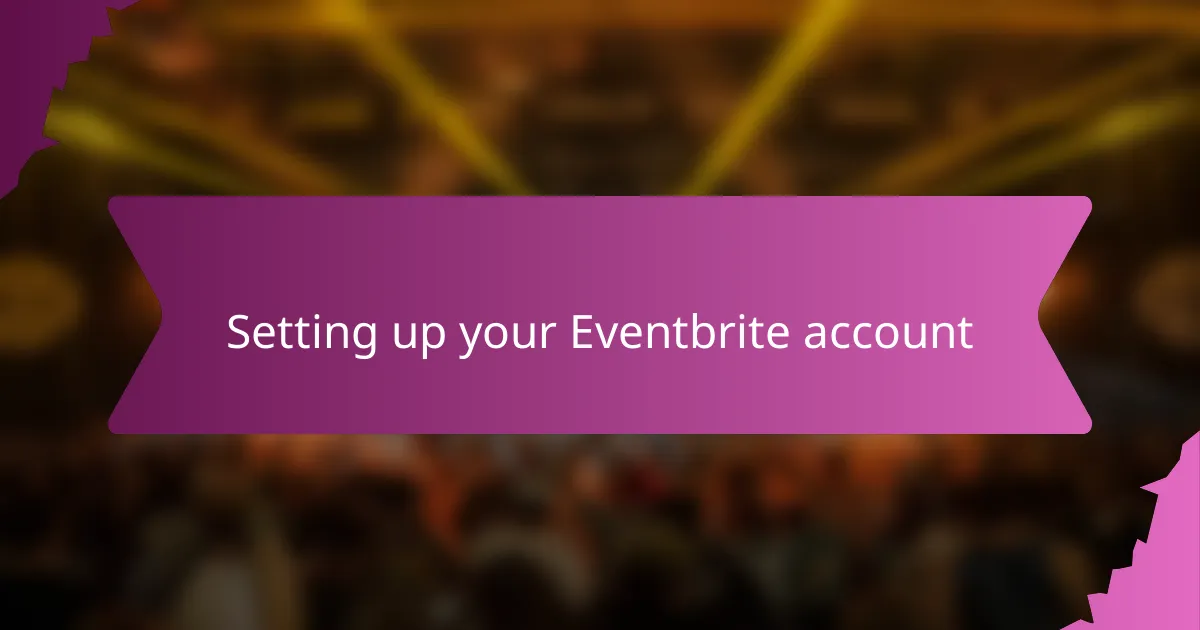
Setting up your Eventbrite account
Creating my Eventbrite account was surprisingly simple—it didn’t take long, and that was a relief when I was already juggling so many details. I remember hesitating over what information to include at first, but the platform’s step-by-step prompts guided me easily through the process. Have you ever been stuck wondering what to fill in on sign-up forms? Eventbrite made that worry disappear.
One thing I found particularly helpful was linking my payment details early on. It felt like setting up a solid foundation so I wouldn’t run into glitches when tickets started selling. That small step gave me peace of mind, knowing that revenue flows wouldn’t get tangled up while handling the creative side of my music projects.
Also, customizing my profile to reflect the vibe of my events struck me as more than just a formality. It’s like introducing myself to potential attendees before they even arrive. By adding a personal touch—photos, bios, and social media links—I felt I was building a relationship with my audience right from the start. Wouldn’t you agree that first impressions matter, especially in the music scene?
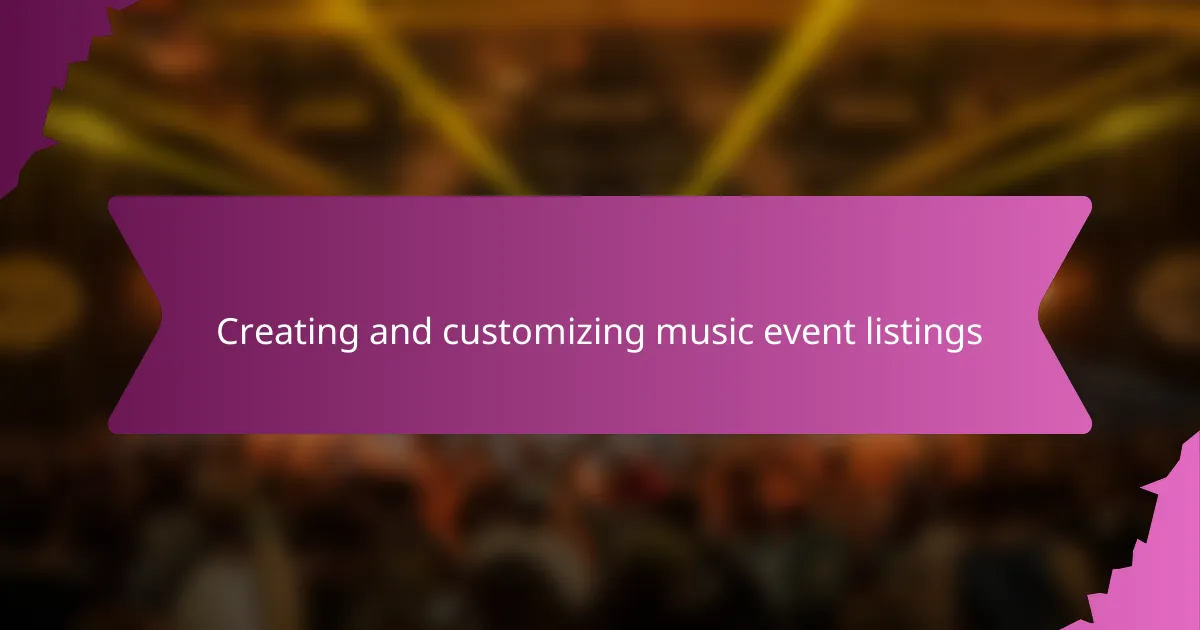
Creating and customizing music event listings
One of the things I appreciate most about creating music event listings on Eventbrite is how much control I have over customization. I can tailor every detail—from the event title and description to the images and ticket types—in a way that truly reflects the energy of the music project. Have you ever struggled to explain the vibe of your event in just a few words? Eventbrite’s layout made it easier for me to capture that essence and entice my audience.
I remember the first time I uploaded a playlist preview and added artist bios directly into the listing. It wasn’t just about promotion; it felt like inviting people to get to know the story behind the show. That personal connection seemed to boost interest, and more attendees signed up, which was incredibly rewarding. Don’t underestimate how much a well-crafted event page can speak for the music.
Another feature that stood out to me was the flexibility with ticket options. Whether it’s early bird, VIP, or group tickets, having the ability to set these up seamlessly gave me a toolkit to attract different segments of fans. Plus, updating or adding ticket types on the fly was a lifesaver when demand shifted. Have you ever wished you could adapt your event on the go? Eventbrite lets you do just that, keeping the experience dynamic and responsive.
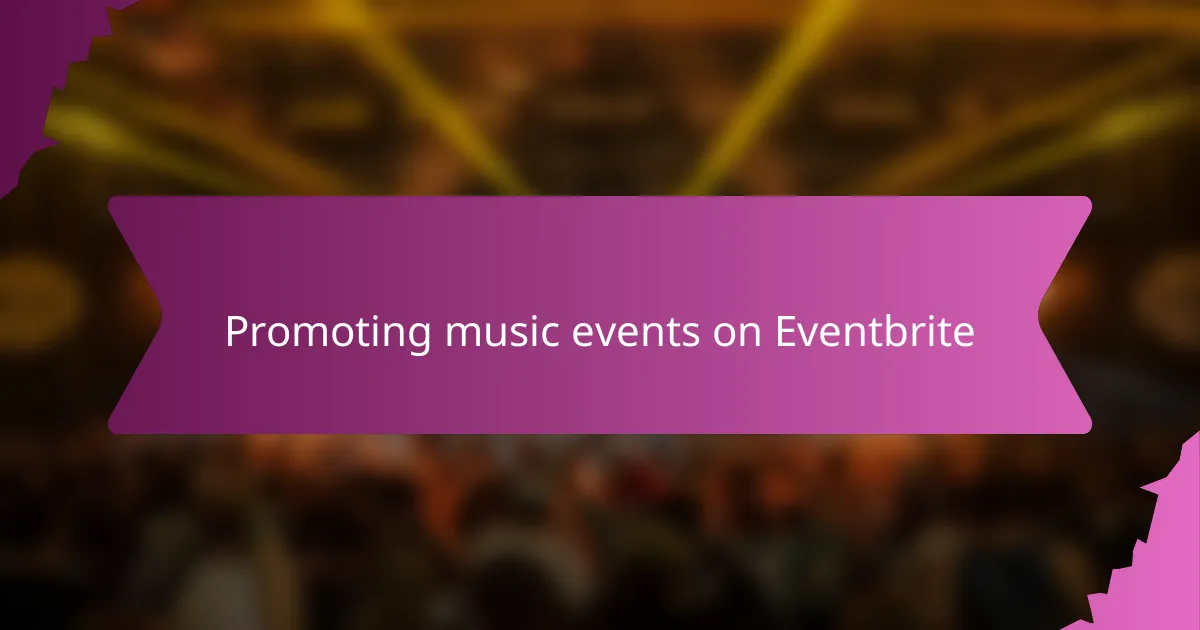
Promoting music events on Eventbrite
Promoting music events on Eventbrite felt like stepping into a megaphone that actually reaches the right ears. I was surprised at how easy it was to share my event across social media channels directly from the platform, turning a simple click into real buzz. Have you ever posted event links endlessly but wondered if anyone noticed? Eventbrite’s built-in tools changed that for me by amplifying visibility effortlessly.
Another trick I found useful was using Eventbrite’s email campaigns to connect with my audience. Sending personalized updates and reminders didn’t feel like spam; it felt like keeping the conversation alive with friends who are genuinely excited about the music. That personal touch sparked more ticket sales than I expected and made me realize how much communication matters in promotion.
Timing turned out to be a secret weapon, too. Eventbrite’s analytics helped me spot when people were most likely to buy tickets, which meant I could ramp up my promotional efforts strategically. It was like having a backstage pass to audience behavior—knowing exactly when to shout about the event rather than just hoping for the best. Doesn’t that feel way more satisfying than random social media posts?
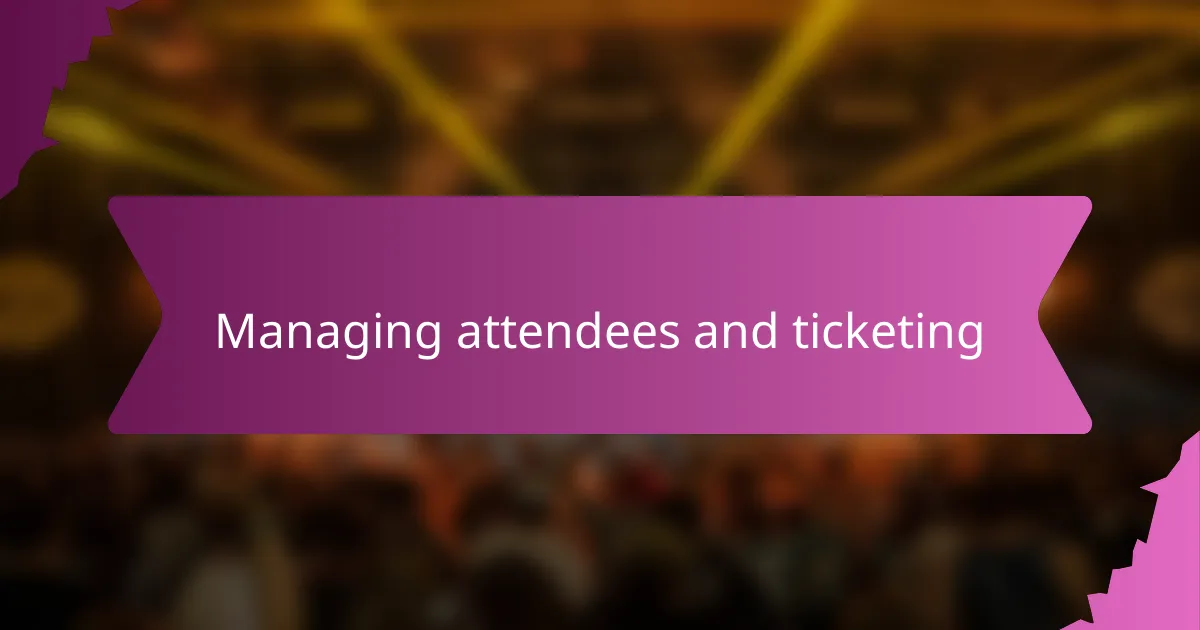
Managing attendees and ticketing
Managing attendees with Eventbrite felt surprisingly smooth. Instead of scrambling to track RSVPs across emails and spreadsheets, I had real-time updates right at my fingertips. Have you ever lost precious time trying to match names with payments? Eventbrite’s integrated system made that headache disappear.
Ticketing was another game changer. Setting up different ticket tiers—early bird, general admission, VIP—was more intuitive than I expected. It gave me the flexibility to reward loyal fans while keeping things accessible. Plus, when demand spiked, I could quickly adjust inventory without breaking a sweat. Have you ever worried about selling out too soon or not soon enough? That control made me feel confident throughout.
Communicating with attendees after they signed up also became effortless. I could send updates, reminders, or even last-minute changes directly through the platform, keeping everyone engaged and informed. From my experience, this level of communication boosted the overall vibe—people felt more connected and excited, and so did I. Isn’t that what every event organizer hopes for?